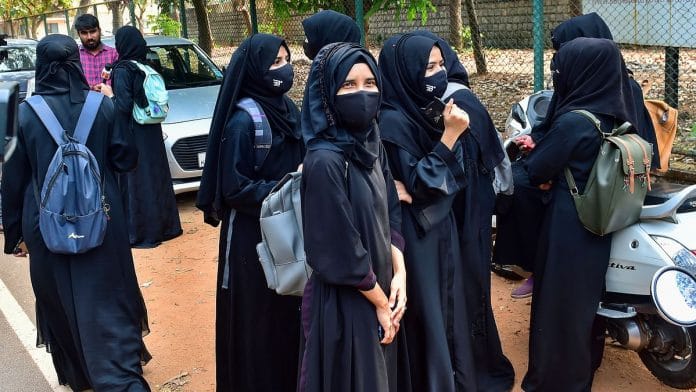New Delhi: The Karnataka High Court judgment that upheld the hijab ban in some pre-university (PU) colleges of the state and declared that the headgear was not part of essential religious practice in Islam, makes “unwarranted and derogatory observations, statements offending the dignity of practising Muslim women who wear hijab”, the All India Muslim Personal Law Board (AIMPLB) has said before the Supreme Court.
The order in question was issued by the state government on 5 February, essentially supporting the ban on hijab issued by a PU college in Udupi.
In a petition filed Monday, which challenges the HC’s 15 March verdict, the AIMPLB attacked the judgment for “closing doors” to the Muslim women who wear hijab to all government institutions, agencies and seeking employment in government or semi-government entities.
The AIMPLB works for the protection and applicability of Muslim personal law in India.
The right of Muslim women to be in a headscarf flows from Articles 19 (1)(a) and 21 of the Constitution, the board insisted, maintaining the HC framed erroneous questions in the case, particularly on the argument made in connection with whether hijab is an essential religious practice in Islam.
The board added the questions framed do not address the core issue whether or not it is necessary to consider the doctrine of essential religious practice where the petitioners asserted their rights under other provisions of the Constitutions such as right to conscience and privacy. It further said the HC laid down too much emphasis on propositions that have led to discrimination, exclusion and overall deprivation of a class from the mainstream public education system. Apart from this, the board said, the judgement “seriously encroaches” upon an individual’s sacrosanct religious belief.
Notably, the board was not a party before the Karnataka HC when the matter was argued there. It has sought permission from the top court to become a party in the case before it, and wants to be heard when the SC takes up the appeals filed against the HC verdict.
Two women members of the AIMPLB have also joined the board to challenge the HC judgment. So far, the top court has not accorded urgent hearing to the appeals in the hijab case.
Last week, a bench led by Chief Justice India N.V. Ramana declined to list the appeals for a hearing soon. It chided the lawyer who mentioned the matter and said the issue had nothing to do with the forthcoming exams in the state’s PU colleges (classes 11 and 12).
Further, the bench advised the advocate not to “sensationalise the issue”.
Also read: What is an ‘essential religious practice’, and why hijab didn’t make the cut for Karnataka HC
‘HC misdirected itself’
In its petition, the AIMPLB claimed the HC “misdirected itself by framing totally erroneous questions which has distracted itself from the real issues”.
“It is the fundamental principle of judicial determination that the deciding authority should focus on the material questions involved in the controversy before it,” the board said.
The judgment “presents an erroneous understanding of the Islamic texts particularly the primary and highest source of Islamic law,” which is the Holy Quran, it said.
The verdict “transgressed” into the arena of interpreting Hadith of the Prophet and has displayed its “complete lack of understanding of the rules of interpretation of Al-Quran”.
The board accused the HC for “arrogating” the power to interpret the holy book and stretching its application to reach a wrong conclusion as what is “non-essential” to religion for upholding a Government Order.
“The impugned judgment further erases and invisibles basic religious freedom and freedom of expression, agency of Muslim women, principles of equality, fraternity and actively perpetuates discrimination, communal discord and intervenes in the protected area of privacy,” the petition said.
Moreover, it legitimises “hijab ban” in educational institutions, which goes against the very basic structure of secularism, it added.
The judgment will lead to grave encroachment on the children of Muslim community and shall lead to a situation where a large section of Muslim girls will be deprived from stream of general education leading them to remain in vulnerability, the plea said.
(Edited by Amit Upadhyaya)
Also read: The politics behind Karnataka’s hijab row: Sliding Congress, rising SDPI, combative BJP






